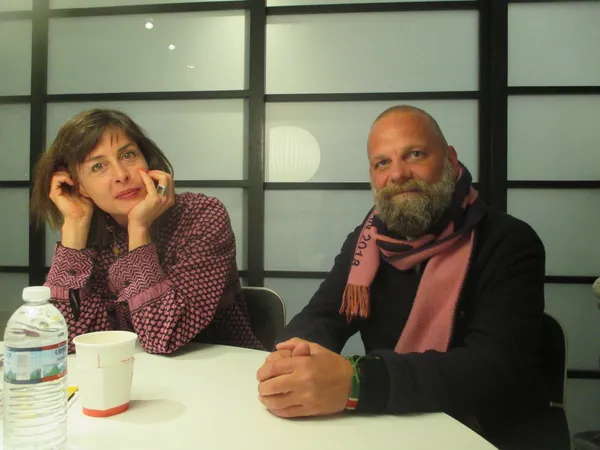 |
| Susanne Wolff with Styx director Wolfgang Fischer on rescuing Kingsley (Gedion Oduor Wekesa): "I remember that we had a rehearsal to check out how difficult it is." Photo: Anne-Katrin Titze |
When Volker Schlöndorff was filming Return To Montauk near Lincoln Center and on the steps of the New York Public Library with Stellan Skarsgård, Nina Hoss, Susanne Wolff, Bronagh Gallagher, Isioma Laborde-Edozien, and Mathias Sanders, he introduced me to the cast and his co-writer Colm Tóibín. At Film Forum before the US theatrical premiere of Wolfgang Fischer’s Styx, I spoke with the director and his formidable star Susanne Wolff about the challenges of shooting on the high seas and how JC Chandor's All Is Lost with Robert Redford did not encounter the same obstacles.
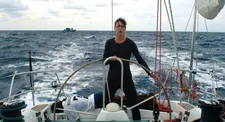 |
| Susanne Wolff is Rieke in Wolfgang Fischer's Styx: "90% of the movie we shot on open ocean." |
Wolfgang Fischer's impassioned Styx, co-written with Ika Künzel and shot by Benedict Neuenfels, takes us on an unexpected journey. Rike (Susanne Wolff, a forceful presence in almost every scene) is a German emergency doctor. For a brief episode, after an introductory moment where we follow the city monkeys of Gibraltar, we see her in her professional element in Germany. She is a woman who knows what she is doing, and what she wants to do in her free time when she doesn't rescue people. On a boat, sailing to Ascension Island in the South Atlantic, where Charles Darwin experimented with the coexistence of native and non-native flora and fauna.
Rike enjoys the time alone on her yacht until, after a violent storm, she finds herself confronted with a leaky, sinking, overcrowded fishing boat carrying desperate refugees. One of them, a boy with a bracelet spelling out Kingsley, manages to swim over to her. What is she to do? The Coast Guard seem to be stalling with their help, her own vessel could not hold all the refugees and she is being told to stay out of it.
You can feel that the director and his crew did actually film at sea and it makes the dilemma all the more tangible. Susanne Wolff's performance is thrilling in its physicality and her moment of reckoning takes your breath away.
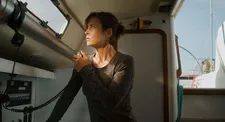 |
| Wolfgang Fischer on Rieke (Susanne Wolff): "She's a professional helper and it's her duty to help, but it's impossible because she is alone." |
Anne-Katrin Titze: We've met once before, very briefly, on the steps of the New York Public Library. Volker Schlöndorff introduced us. I was an extra together with Margarethe von Trotta, standing on the top of the stairs. I don't know if you remember that day shooting with Stellan Skarsgård and Colm Tóibín?
Susanne Wolff: Of course. Yes, with the writer himself.
AKT: Styx feels like four films in one. Two shorts and two longer ones. I loved the beginning with the monkeys in Gibraltar. You could have just gone on with that and I would have been happy. Do you know a film called KEDi [directed by Ceyda Torun], about the cats of Istanbul?
Wolfgang Fischer: No.
AKT: The filmmaker developed a special way with the camera to follow the cats. I thought about it with your monkey movements. The second part of your film is in Germany that explains very efficiently where the main character comes from. Then comes the first part on the boat and the second, very different, part on the boat. Was this the concept?
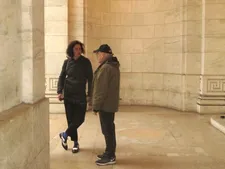 |
| Susanne Wolff with Volker Schlöndorff on the set at the New York Public Library for Return to Montauk Photo: Anne-Katrin Titze |
WF: I haven't seen it in this way but it's interesting. In the beginning, the main idea was to make a movie about ourselves and to raise the question - who are we? And the second part was to make a movie about migration because that's the theme that will follow us for the next decades. We follow our main character, she is introduced as an emergency doctor, so we see she's a professional helper. For us it was exciting to show a woman alone on a boat. How does she react? What kinds of skills does she have to have?
That's how we built up the story and we wanted to take time with the main actress. It was so complicated for us to find out how to shoot on an open boat, because 90% of the movie we shot on open ocean. We couldn't find out how to do it from other directors because everyone goes into tanks or works with blue screen or CGI. We wanted it in reality and not to fake it.
AKT: It feels that way. We can sense that you are on this boat. I could almost smell it.
WF: In the beginning, the firefighters are real firefighters, the rescue teams are real rescue teams, we didn't work with extras. The soldiers on the Coast Guard ship, they were soldiers from the Maltese army. And the people on the boat which is going to sink are human beings who did the dangerous crossing over the ocean.
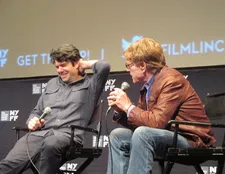 |
| Robert Redford with All Is Lost director JC Chandor Photo: Anne-Katrin Titze |
We did big research and were talking with NGOs. How does help function in Europe? And what happens out at the borders of the European community? How does help function under these circumstances? To show the contrast, that was the structure. The main character, when she is in danger, immediately someone is coming in order to rescue her.
AKT: Bodies that matter.
WF: And you have this boy Kingsley also on board. The question was how to cast this role. For us it was awkward to look around in Berlin, in Europe, to find the right Kingsley for us. And then a friend of ours, Tom Tykwer, the director who did Run Lola Run, he has an organisation in Nairobi, in the slums of Nairobi, which is called One Fine Day.
It has schools in the slums where children can explore their creativity. We went with Susanne to Nairobi and we did a casting where we found Kingsley in Gedion [Oduor Wekesa]. He has never been to the ocean, he didn't know how to swim. He learned how to swim and he did this crazy journey with us. It was more than just doing an entertainment movie for us.
AKT: It's clear. You even have it in the title. Styx is the mythological river separating the living from the dead. In this case, who gets help and who doesn't. There is this scene in the film where you, Susanne, are pulling up the boy onto the boat. It is impressive. This is real struggle to get him up on that boat.
 |
| Susanne Wolff and Wolfgang Fischer under the Film Forum marquee Photo: Anne-Katrin Titze |
I was reminded of Hitchcock's Torn Curtain, where Paul Newman and the farmer's wife push Gromeck in the oven. And Hitchcock commented that he wanted to show how difficult it is to kill someone. In Styx it's the opposite, you wanted to show how difficult it is to rescue someone, simply physically?
SW: I remember that we had a rehearsal to check out how difficult it is. And also the position of the DP [Benedict Neuenfels], where he can shoot. When I did it the first time, I realised it's impossible to just say "I give you a hand and I pull you up." I decided to jump into the water and then I realised, you have no ground, of course, and it's impossible to get somebody up when he is more or less unconscious.
And I have to say, if he were actually unconscious, it's impossible to get a young skinny boy, 14-years-old, into that kind of boat. It took me eight, maybe nine minutes, with his help and it was really exhausting. And I'm strong!
AKT: Advertising your film, All Is Lost with Robert Redford comes up in comparison. A person on the boat alone, and you are the female Robert Redford. At the New York Film Festival press conference for All Is Lost, I asked Robert Redford about the fact that he is shaving right before the boat sinks. The action could be seen as counterintuitive. There are some counterintuitive actions you take in the film. Whenever there's a storm, you eat.
SW: I think these are two different attitudes. A man shaves his beard just facing the chaos. I remember stories of people, maybe in camps, that say it's so necessary that you keep yourself together. Taking care of your appearance makes you clear.
And in the case of that woman its a sign that she is a professional, that she knows it will take a long time and will get worse and that this might be the right situation to eat something because there will be no time anymore to eat something because a storm is going on for hours.
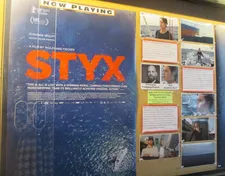 |
| Styx poster at Film Forum in New York Photo: Anne-Katrin Titze |
AKT: Two different things, and both clear decision making. The Hippocratic oath comes into play as she is a doctor. Was it always clear that she was to be a doctor?
WF: Yes, she's a professional helper and it's her duty to help, but it's impossible because she is alone. This conflict can only be solved together. Concerning All Is Lost, it was a little bit bizarre for us because we wrote the script nine years ago and then suddenly there was All Is Lost.
AKT: And you felt for a moment that all is lost?
WF: Yeah. And then I saw the movie and they did everything in CGI and tanks ad blue screen and you don't even see him sailing by himself. And then I was not so afraid of the movie anymore.
Styx is screening at Film Forum in New York and will open in the UK on 26 April.
























